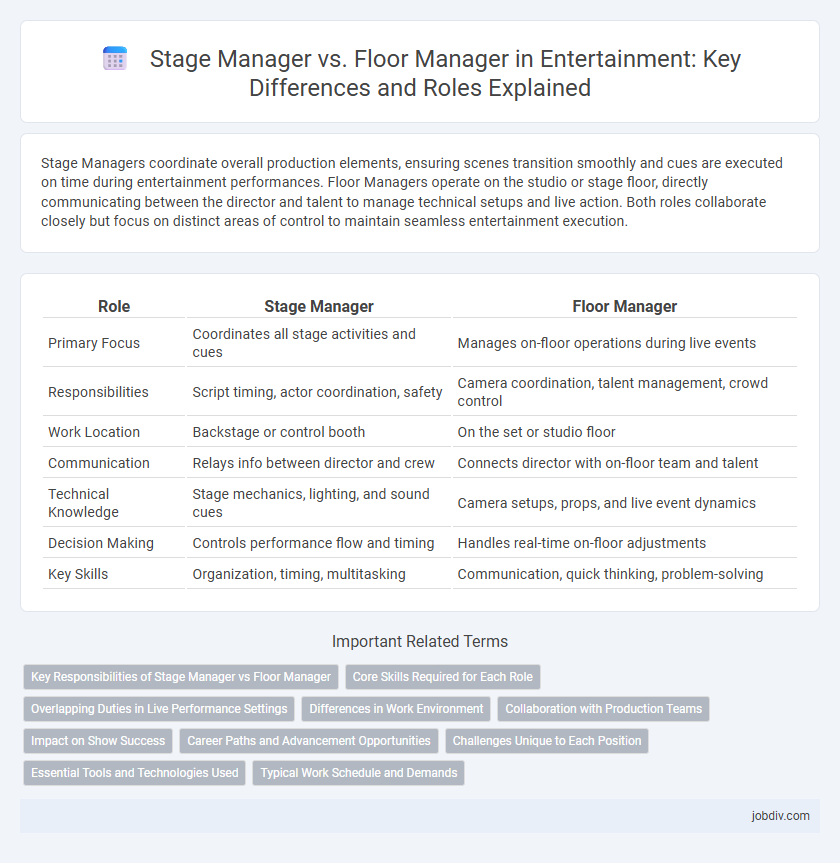Stage Managers coordinate overall production elements, ensuring scenes transition smoothly and cues are executed on time during entertainment performances. Floor Managers operate on the studio or stage floor, directly communicating between the director and talent to manage technical setups and live action. Both roles collaborate closely but focus on distinct areas of control to maintain seamless entertainment execution.
Table of Comparison
| Role | Stage Manager | Floor Manager |
|---|---|---|
| Primary Focus | Coordinates all stage activities and cues | Manages on-floor operations during live events |
| Responsibilities | Script timing, actor coordination, safety | Camera coordination, talent management, crowd control |
| Work Location | Backstage or control booth | On the set or studio floor |
| Communication | Relays info between director and crew | Connects director with on-floor team and talent |
| Technical Knowledge | Stage mechanics, lighting, and sound cues | Camera setups, props, and live event dynamics |
| Decision Making | Controls performance flow and timing | Handles real-time on-floor adjustments |
| Key Skills | Organization, timing, multitasking | Communication, quick thinking, problem-solving |
Key Responsibilities of Stage Manager vs Floor Manager
Stage Managers coordinate all aspects of a theatrical production, including cueing actors, managing rehearsals, and ensuring smooth communication between directors and technical crews. Floor Managers oversee live broadcast operations, managing on-air talent, camera positioning, and coordinating real-time cues to maintain broadcast flow. The Stage Manager primarily focuses on theatrical performance continuity, while the Floor Manager ensures seamless execution of live television or event production.
Core Skills Required for Each Role
Stage managers excel in organizational skills, communication, and multitasking to coordinate rehearsals, cues, and overall production flow. Floor managers require quick decision-making, spatial awareness, and the ability to manage live broadcasts or performances on the studio floor efficiently. Both roles demand leadership and adaptability, but stage managers emphasize pre-show planning while floor managers focus on real-time execution.
Overlapping Duties in Live Performance Settings
Stage managers and floor managers both coordinate live performance logistics, ensuring cues for lighting, sound, and set changes are executed smoothly. While stage managers oversee the entire production flow from the control booth, floor managers communicate directly with performers and technical crews on stage. Their overlapping duties include managing timing, addressing unforeseen issues, and maintaining clear communication between backstage and front-of-house teams.
Differences in Work Environment
Stage Managers operate primarily in the controlled studio or theater setting, coordinating rehearsals, cueing performers, and managing stage elements to ensure smooth live or recorded productions. Floor Managers work on the actual studio floor, communicating directly with talent and crew, overseeing real-time adjustments, and maintaining order during filming or live broadcasts. The Stage Manager's environment is more behind-the-scenes and planning-focused, whereas the Floor Manager's role demands immediate response to dynamic, on-floor situations.
Collaboration with Production Teams
Stage managers coordinate closely with directors, lighting, sound, and costume teams to ensure seamless performances, managing cues and timing to align all technical and artistic elements. Floor managers act as the production team's on-site representatives, facilitating real-time communication between the stage and control room, directing performers, and managing stage logistics. Their collaboration ensures smooth execution of live shows by synchronizing backstage operations with production requirements.
Impact on Show Success
Stage managers coordinate cues, manage rehearsals, and ensure seamless transitions, directly influencing the overall flow and timing of a production. Floor managers handle on-the-ground logistics, communicate between the director and crew, and manage live adjustments, which stabilizes the environment during performances. Both roles are crucial for show success, with stage managers focusing on planning precision and floor managers maintaining real-time control.
Career Paths and Advancement Opportunities
Stage Managers typically advance by gaining experience in theater production, moving toward roles like Production Manager or Director, with opportunities in larger venues and touring companies. Floor Managers often progress within television or live event production, advancing to positions such as Technical Director or Broadcast Producer, emphasizing real-time decision-making and coordination skills. Both career paths require strong organizational abilities but diverge in industry focus, with Stage Managers rooted in theatrical arts and Floor Managers in broadcast and live event environments.
Challenges Unique to Each Position
Stage managers face challenges such as coordinating complex technical cues, managing rehearsals, and maintaining communication between the director and cast to ensure a smooth performance. Floor managers must handle on-the-ground issues like audience coordination, timing of live events, and quick problem-solving to address unexpected disruptions. Both roles require adaptability, but stage managers tackle pre-planned logistical details, while floor managers respond dynamically to real-time challenges.
Essential Tools and Technologies Used
Stage Managers rely on digital cue sheets, communication headsets, and lighting control consoles to coordinate performances efficiently. Floor Managers use two-way radios, timing devices, and portable communication systems to maintain seamless interaction between crew and talent during live events. Both roles depend heavily on real-time communication technology and organizational software to ensure smooth production flow.
Typical Work Schedule and Demands
Stage Managers typically work long, irregular hours including evenings, weekends, and holidays to coordinate rehearsals and live performances, often requiring quick decision-making under pressure. Floor Managers usually have similar hours during productions but focus more on managing on-stage activities and communicating between the director and crew during filming or live shows. Both roles demand physical stamina, attention to detail, and the ability to adapt to constantly changing schedules in fast-paced entertainment environments.
Stage Manager vs Floor Manager Infographic

 jobdiv.com
jobdiv.com